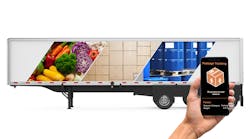This is part two of a four-part series on reducing empty miles. Read part one here.
To fill empty miles with loads that aren’t their own, private fleets must acquire for-hire authority to pursue revenue-producing freight, Petty said. Of those private fleets with for-hire authority, 19% indicated they maintain an internal sales force and 51% said they act as brokers, NPTC reported. In addition, 60% of private fleets with for-hire authority reported using brokers.
Frito-Lay has its own in-house broker with Pepsi Logistics Co., which helps it fill empty miles. “We also rely on our engaged drivers as they’re making deliveries to identify potential leads,” Roberts said.
There are a lot of variables and constraints associated with any load, and Jackson said equipment requirements, expected dwell times, and miles generated are all taken into consideration. Penske has a profitability tool that evaluates each opportunity on a tactical and operational level to identify potential costs and disruptions.
“If you miss an outbound load and you had to put that load on a third party because you missed it, you have to understand the cost and have a mitigation strategy,” Jackson said. “If we have a driver coming back with a backhaul, but he or she would be out of hours, rather than decline it, we may drop it and have a local driver pedal it to the final destination. There are some creative ways you can do it.”
NPTC’s Petty said private fleets have to be sensitive about shipping a competitor’s products as well as which products they haul. “If we’re running food products in our dry van, are we going to really allow a load of construction materials? Probably not,” he said.
Frito-Lay hauls snack foods, so it does not haul freight that would be considered hazmat or leave an odor in the trailers, Roberts said. “It can be hard to find the right fit to ensure that the freight you’re hauling doesn’t interfere or conflict with your primary operation,” she explained, adding that Frito-Lay ensures out-of-route miles and incremental loading and unloading times still make the backhaul profitable. “Ideally, if there is enough volume and consistency in a lane, we’d prefer to have dropped trailers so our drivers can just drop and hook and get on their way versus waiting for a live load and unload.”
Mark Hackl, CEO of LaneHub, said LaneHub’s technology makes it easier for shippers to contract with private and dedicated fleets. “Most private carriers don’t have a sales team to find backhaul. Part of what LaneHub does is act as a sales agent to help them find areas that have freight that match well with their fleet,” he said.
Many private fleets have been growing the capacity of their private fleet and shrinking their outside carriers. “That puts even more pressure on them to get optimization of those backhauls,” Petty explained.



